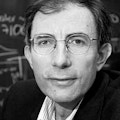Dimitar Sasselov, Ph.D.
Director, Harvard Origins of Life InitiativeProfessor, Department of Astronomy, Harvard UniversityDimitar Sasselov’s website

SCOL Project: Exoplanets and the Planetary Origins of Life
The synthesis of the first molecules of life in the young solar system, and specifically on the early Earth, was informed by astrophysics and planetary chemistry. The discovery of Earth-like exoplanets now allows us to explore directly such early environments and their effects on geochemistry. This exoplanet exploration is a necessary step in our attempt to search for life beyond Earth, but it is also very helpful in constraining plausible pathways in prebiotic chemistry. To this effect our effort will leverage major NASA facilities coming online: the 2018 NASA TESS mission (Sasselov is a co-investigator) and the 2020 NASA James Webb Space Telescope. In the lab and theoretically, we plan to study the intricate role that UV light from the sun and stars plays in the synthesis of a very selective set of molecules that become the foundation of life. Ultimately, we will continue to seek a reliable overlap between what works in the lab and what planetary conditions can be found and confirmed observationally on exoplanets or in the early Earth and Mars record.
Bio:
Dimitar Sasselov studies stars and planets at Harvard University, where he is a professor of astronomy. His research explores modes of interaction between light and matter. He and his team discovered several planets orbiting other stars with novel techniques he hopes to use to find planets like Earth. His book “The Life of Super-Earths” (Basic Books, 2012) describes the renewed search for life on other planets.
In 1988, Sasselov acquired his Ph.D. in physics from Sofia University, followed by his Ph.D. in astronomy from the University of Toronto in 1990. In 1999 Sasselov became an Alfred P. Sloan Fellow. He has numerous awards and has lectured at DLD, TED and Davos.
Sasselov is the founding director of the Harvard Origins of Life Initiative, a cross-disciplinary research effort bridging the physical and life sciences. He was a senior science advisor for the Radcliffe Institute for Advanced Study in Harvard and a member of the Global Agenda Council on Space Security at the World Economic Forum.